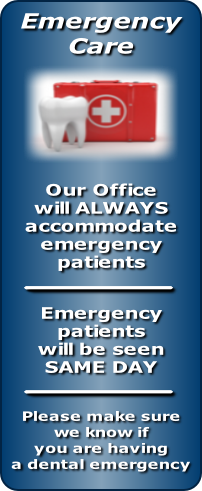











Questions About Root Canals:
Root canal therapy is a safe and predictable dental procedure used to save a natural tooth that might otherwise need to be extracted. During the procedure inflamed or infected pulp tissue is removed and the inside of your tooth is cleaned, shaped, and disinfected. The hollow space inside your tooth is then sealed with an inert root canal filling material. For more information, please visit the What Is a Root Canal section of this site.
Needing a root canal can be very painful. Getting one shouldn't be. We will take every measure to ensure that your procedure is not uncomfortable or painful. If someone you know tells you a "horror story" about their experience with getting a root canal, they probably went to the wrong place.
Yes. Our procedures are routinely performed with only local anesthetic. Although parts of your mouth may be numb when you leave or office, the rest of you will be fully functional.
Yes. Most of our patients go immediately back to work, school or other normal activities as soon as they leave our office. You do not need to take a month, a week, or even a day off to recover. But if you want to spoil yourself and take a day off, we won't object.
The vast majority of routine root canals performed in our office are completed in a single visit. Teeth requiring re-treatment or emergency treatment, teeth with actively draining infections, and teeth with overly complicated anatomy may require additional visits.
Treatment time varies based on the procedure needed and the complexity of the tooth being treated. Most treatment appointments take between an hour and an hour and a half.
Yes. The majority of root canals done in this country are performed by general dentists. However, endodontists have additional training, experience, and expertise that allow us to complete root canal treatments more efficiently, effectively, and painlessly.
Your dentist sent you to us because he or she wanted to make sure you received the highest quality of care possible and the best treatment outcome. For more information about why you were sent to us check out the Why Advanced Endodontics? section of this site.
No. The roots of your tooth are what anchors the tooth in your mouth and they will remain intact after your root canal treatment. Inside the roots are hollow spaces, or canals. During your treatment, these spaces will be cleaned, disinfected and sealed.
We routinely perform root canal treatment on teeth that already have crowns. If your existing crown is in good shape, we will simply make a small access hole through the biting surface of the crown to perform treatment. If we find decay or an opening under the edges of your crown, or if the crown cracks or breaks during treatment, you may need to have a new crown made by your general dentist. This is rare and the vast majority of root canals we perform through crowns only require a small filling to seal the access hole once treatment is completed. Ultimately, the decision whether to replace or just repair your existing crown is usually left up to your general dentist.
Yes. Teeth that have a root canal will require placement of a permanent restoration by your general dentist once root canal treatment has been completed. For most teeth, and especially posterior teeth, this means placement of a crown (cap). Some teeth, such as structurally intact front teeth, or teeth that already have crowns, will require only the placement of a filling to permanently restore the tooth. Your general dentist will help you determine what is the most appropriate way to permanently restore your tooth after root canal therapy.
With timely placement of a permanent restoration and proper care, your root canal treated tooth can last a lifetime!
Yes. Before treatment can be initiated, we must have a pre-operative radiograph showing the current state of your tooth. If a current and adequate radiograph has been provided by your general dentist, we may not need to take our own. Once treatment is completed, we will take a final radiograph to check the status of your treatment and to send back to your general dentist with our treatment report. Additional radiographs may also be needed during the treatment process.
No. Although antibiotics may be used to alleviate the symptoms of an infected/abscessed tooth, they cannot cure the problem. Antibiotics can only help your body fight the infection in the gum and bone around your tooth. Once the pulp tissue has died, there is no blood flowing into your tooth, so the antibiotics and your immune system cannot get to the source of the infection which is hiding inside your tooth. Root canal therapy is needed to remove the source of the infection from within your tooth to prevent continued recurrence and re-infection of the surrounding tissues.
Although root canals are generally highly successful procedures, it is possible to have a problem with a tooth that has been previously treated. If the problem is related to a failure of the existing root canal, you will have three options: 1) Re-treatment of the root canal, 2) Apicoectomy (surgical re-treatment of the tooth), or 3) Extraction. A consultation with one of our specialists is the best way to learn about your options and determine which one is best for you.
There is an incredible amount of misinformation about the "dangers" of root canals that can be found on social media, YouTube, and other internet sites. For the real story behind many of these false claims please visit RootCanalTruth.com
Questions About Insurance and Payment:
Most dental insurance plans cover root canal treatments. They are typically covered at 80% (although some plans may cover less or more). Once you have provided our expert staff with the details of your coverage, they will be happy to contact your insurance carrier and provide you with an estimate of your coverage. For more information about dental insurance see the Financial and Insurance Info section of this site.
We participate with many dental insurance plans including: Aetna (DMO and PPO), Anthem Blue Cross, Assurant, Benecare, Cigna (DMO and PPO), Delta Dental, Dental Health Alliance (DHA), GE, Fortis, Genworth, Sunlife, Guardian, Principal, United Concordia, Wellpoint, and many others. Even if we aren't a participating provider for your specific coverage plan, our office will still accept assignment of benefits from most dental plans.
Due to the increasingly complicated nature of today's dental insurance options, it is no longer a simple matter to determine if we are an in-network provider for your specific coverage plan. Once you provide us with your insurance policy and subscriber information, we will be happy to verify our status as an in-network provider for your specific plan.
Payment of the estimated patient portion is due at the time services are rendered unless other arrangements have been made in advance. For more information on making payments please see the Financial and Insurance Info section of this site.
Questions About Our Office:
We typically start treating patients at 8:00 AM. Our last appointment for treatment usually begins no later than 3:30 PM since treatment typically takes an hour or more and we need to reserve time at the end of the day for treatment of emergency patients.
One of our doctors is on-call 24 hours a day, seven days a week, 365 days a year. If you are having a dental emergency, just call either office and our voicemail system will direct you with how to leave a message for the on-call doctor. Emergency calls will be returned with a few minutes whenever possible.
No (except for certain cases). Although most of our patients are referred to us by their general dentists, some are referred by friends or family, some direct themselves to our office since they have seen us before, and some patients find us on their own. No specific dentist referral is necessary unless you have dental coverage through a DMO or DHMO type plan. Some of these plans will not cover treatment by a specialist unless your designated and assigned general dentist fills out and signs a referral form that is specific to your particular insurance carrier. This form must be presented to our office for your treatment to be covered.
Over the past 29 years, our 4 specialists have performed more than 50,000 root canal treatments.








 for answers)
for answers)